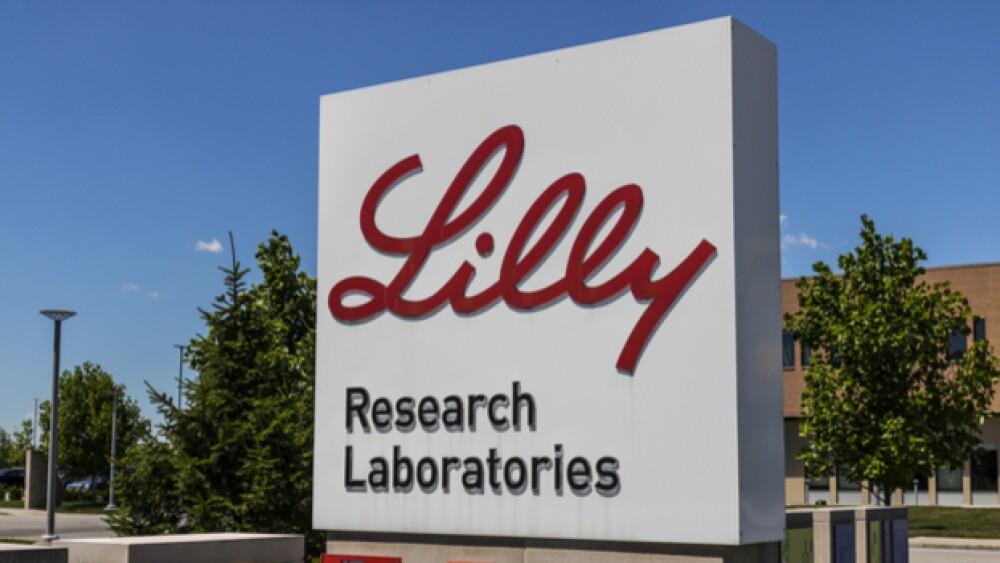Those 10 drugs that were launched over the past five years are expected to account for more than 45 percent of human pharmaceutical sales in 2019, Joshua Smiley, Lilly’s chief financial officer said.
Jonathan Weiss / Shutterstock.com
Shares of Eli Lilly are up nearly 5 percent in premarket trading after the company announced its financial guidance for 2019 shows expected revenue of between $25.3 billion and $25.8 billion that will be driven by revenue from branded drugs such as Trulicity, Taltz, Verzenio and the newly-launched Emgality.
Over the past five years, Indianapolis-based Eli Illy has launched 10 new drugs and that performance is expected to continue through 2019. This morning, Lilly said pipeline progress is expected through the next calendar year, which will include expected regulatory action in the United States for its hypoglycemia and migraine treatments, as well as others.
During an “investment community meeting” this morning, Lilly’s chairman and chief executive officer David A. Ricks said the company is “executing well” against its priorities to “launch with excellence, replenish the pipeline, improve productivity and develop talent.” Ricks added that not only has Lilly launched those new drugs over the past half-decade, but during that same time period it has also bolstered its pipeline with new drug candidates and has also attracted “world-class scientific talent” to the company.
“Our actions over the past several years have positioned Lilly to deliver significant value to our key stakeholders. Most importantly, they have benefited patients, many of whose lives are better because of new Lilly medicines,” Ricks said in a statement.
Those 10 drugs that were launched over the past five years are expected to account for more than 45 percent of human pharmaceutical sales in 2019, Joshua Smiley, Lilly’s chief financial officer said. Smiley noted that those 10 drugs have launched in “some of the fastest growing categories” of drugs and have continued to “deliver growth through increased volume, not price.” That means, Smiley said, “more and more people around the world are benefitting from Lilly medicines.”
During the investment meeting, Rocks said the company is poised for continued growth. He said the company sees “incredible scientific opportunities” to address health issues that affect an aging society. Looking at the future, Ricks said the company will develop medicines to transform the care of patients battling serious illnesses.
Lilly Chief Scientific Officer Daniel Skovronsky highlighted some of the company’s recent advancements, including the reshaping of its drug discovery engine. Lilly has a goal of decreasing the time from target identification to clinical testing to about three years. Additionally, the company hopes to increase the use of “externally-derived innovation” to access novel targets and discovery tools, Skovronsky said. When it comes to late-stage clinical trials, Skovronsky noted that the company has seen a “steady improvement” in the success rate of Phase III molecules in its pipeline due to a “greater emphasis on target validation, patient population, molecule optimization, more robust Phase II data, and better Phase III design.” That strength of trial design as reduced the average time from first human dose in clinical testing to potential commercial launch, the company added.
“Lilly has created an industry-leading late-stage development organization and now we are focused on transforming our drug discovery engine,” Skovronsky said in a statement. “With an attractive clinical pipeline, two new molecules achieving regulatory submissions and three entering Phase III in 2018, we are continuing an impressive period of productivity for Lilly Research Labs, and are on pace to deliver on the company’s goal to launch 20 new medicines in 10 years.”
As part of its 2019 financial guidance, Lilly said it anticipates divesting its remaining interest in Elanco Animal Health within one year of Elanco’s initial public offering.
While revenue is expected to grow off the backs of the drugs mentioned earlier, Eli Lilly does anticipate lower revenue from its erectile dysfunction drug Cialis and other products that have lost patent exclusivity. Revenue growth is also expected to be partially offset by the negative impact of foreign exchange rates, as well as continued price pressures in the U.S. and some international markets, the company said.





